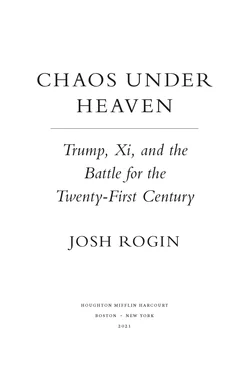ByteDance insisted that it was immune from pressure from the Chinese government, should Beijing ever demand the company hand over user data—but that didn’t match what Chinese national security laws stated. Lawmakers in both parties demanded action, and eventually President Trump declared that ByteDance would have to sell TikTok or shut it down. A series of chaotic negotiations commenced, led by Mnuchin, with the goal of forcing ByteDance to spin off TikTok’s international operation and cede its control to a US company. Trump bizarrely demanded a kickback he called “key money,” for brokering the deal. Beijing was incensed and withheld permission for ByteDance to go along. The company sued the Trump administration in US courts.
Although the national security officials had pushed the ban of TikTok and its larger tech cousin WeChat, the dealmaking was handed over to Mnuchin, who tried to turn it into a windfall for Wall Street and the US tech firms close to Trump, like Safra Catz’s Oracle. This was the kind of ad hoc flailing that made the Trump administration’s policy look capricious and self-serving. Mnuchin was also handing Beijing a talking point and a grievance; now it was the United States who was trying to force Chinese companies to hand over their technology for access to the US market. As of this writing, the company’s fate is still in limbo.
Another Bite of Apple
Large tech companies that were already dependent on the Chinese market or dependent on Chinese factory labor reacted to the rising tensions in US-China relations by assuming a stance much more favorable to Beijing. Apple is the prime example of a US firm that was still determined to stay in the good graces of the CCP, even if that meant making ethical compromises. As the Chinese government tightened control on foreign firms inside China, increasingly using a corporate social credit system to reward or punish them, Apple tried its best to accommodate Beijing.
In July 2018, using the excuse it was “just following the local law,” Apple agreed to move its data for Chinese users to cloud servers inside China, giving up any power to deny those users’ data to Chinese authorities. During the Hong Kong protests in 2019, Apple bent over backward granting Beijing’s demands, including by hiding the Taiwanese flag emoji, removing the news outlet Quartz from the Chinese version of its app store for covering the protests, and removing HKmap.live, an app that protesters were using to organize and avoid police.
With $44 billion in revenue annually coming from the Chinese market, not to mention all its factories there, Apple’s stance makes sense. But it didn’t protect them from Beijing’s ire. In May 2020, China’s Global Times would report that the Chinese government was considering punishments and restrictions on Apple to retaliate against Trump for clamping down on Huawei. Apple wasn’t the CCP’s friend—it was just another corporate hostage.
Sheep of Wall Street
While every other US industry was making the determination that the risks of doing business with China were going up, the leading financial firms on Wall Street were racing faster than ever to not only bring Chinese firms into US financial and capital markets but also invest and direct the money of tens of millions of unwitting Americans into huge Chinese companies at an astonishing rate. Their strategy was based on the assumption that nobody would stop them from sending hundreds of billions of US dollars into the Chinese system. But as the national security community in Washington expanded their activities in this arena, another major clash was in the offing.
For years, the main method through which Chinese companies raised money in US markets was to get themselves listed on the NASDAQ and New York Stock Exchanges, but since Chinese companies didn’t follow the accounting and transparency rules mandated for listing by US law, they found workarounds. For example, Chinese firms would buy out dormant companies that were already listed on the exchanges—a process called a reverse merger, which allowed the Chinese firms to get listed on US stock exchanges without going through the regular process of disclosure and scrutiny. If the companies made money, the US investors were happy. But if they failed, the US investors had no recourse. In its 2017 report, the U.S.-China Economic and Security Review Commission observed that “these listings could pose significant risks for unsuspecting U.S. investors who buy into U.S.-listed Chinese companies.”
Through a combination of lax oversight and rampant abuse, the problems associated with Chinese firms listing on US exchanges mounted. The commission found that through fraud schemes alone, Chinese issuers have stolen billions from US investors with no fear of punishment inside or outside China. The Public Company Accounting Oversight Board (PCAOB), which was created under the Sarbanes-Oxley Act of 2002, lists foreign companies that deny it the ability to inspect their audits, including more than two hundred firms based in China or Hong Kong. After a string of reverse mergers that went bad, hurting US investors, Chinese companies largely began focusing on getting listed directly on US exchanges and conducting initial public offerings (IPOs) to raise US cash. But there was still the problem of them not following US laws on disclosure and accountability.
In 2013, the PCAOB entered into a memorandum of understanding with its Chinese government counterpart that was meant to ensure Chinese companies would adhere to high standards of transparency and disclosure. But Beijing invoked its own national security laws to prevent Chinese firms from actually complying. The CCP didn’t want the cash flowing between the party and its state-controlled companies to be revealed. If those relationships were laid bare, the nature of the party’s control over these companies, their use for strategic purposes, and the corruption endemic in those relationships would be exposed.
Huge Chinese firms like Alibaba took the effort to the next level by launching massive IPOs on American exchanges with the help of Wall Street consultants. Even for these companies and transactions this big (Alibaba raised $25 billion in its 2014 IPO on the New York Stock Exchange), their financial disclosures and filings could not be independently verified. US investors simply could not perform due diligence on Chinese companies in which they were invested.
When the Trump administration came to power, the chairman of the PCAOB, James Doty, was in the middle of trying to negotiate a new arrangement with Beijing. But Doty was removed in 2018 by Securities and Exchange Commission chairman Jay Clayton, who was chosen by Mnuchin. Clayton was also a legal adviser to Alibaba. As he had so many times before, Trump’s pro-business Treasury secretary had effectively short-circuited America’s response to China’s economic aggression.
The massive fraud and corruption these practices allowed eventually became well known enough that a cottage industry of short sellers cropped up. By simply performing basic research on these companies, firms like Muddy Waters Research were able to expose fraud after fraud. They were featured in a 2018 documentary called The China Hustle, which chronicled the efforts of Wall Street whistleblowers to call attention to the huge scope and scale of the probtem. But as so often happened, when China’s economic aggression was exposed, it simply changed its tactics.
The Big Con
After US stock market listings for Chinese firms began to attract too much scrutiny, Chinese firms found a way to raise billions from American investors without going anywhere near American markets. Beijing began to push major Wall Street index providers to include hundreds of Chinese companies in their offerings. These index providers were offshoots of major banks or financial firms whose business was to compile lists of companies based on extensive research that other investors could use to guide their investment decisions, either by licensing through the index providers or just by tracking the lists on their own. The index providers wielded huge influence in the global markets because their decisions caused a cascading effect on other investors—and also because they could include in their listings companies on any exchange, not just the American ones, meaning they were rainmakers for companies all over the world that wanted investment from Americans.
Читать дальше











